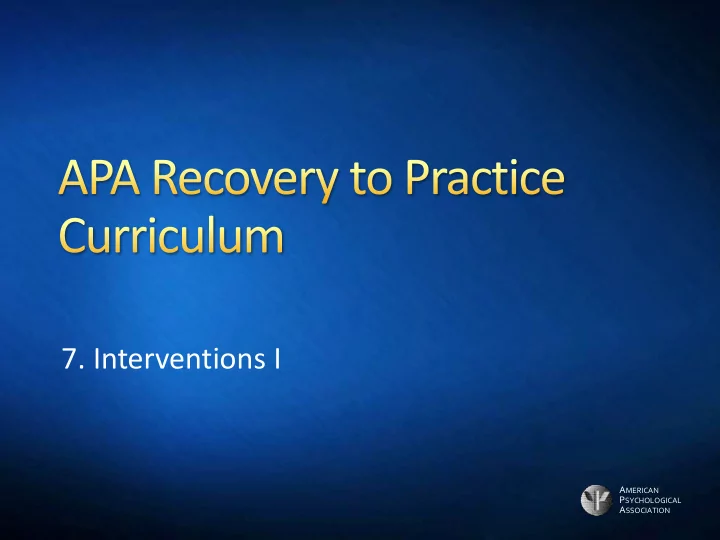

7. Interventions I A MERICAN P SYCHOLOGICAL A SSOCIATION
Underlying Principles Successful provision of services depends on: Belief that recovery will occur Empathic genuine, trusting relationship Involvement of, and partnership with, people with serious mental illnesses in decisions about their health care Culturally relevant services Gender specific services for trauma Recognition of need to provide services to meet goals identified by person Identification of skills and resources needed for successful living A MERICAN P SYCHOLOGICAL A SSOCIATION
Principles identified by SAMHSA’s National Consensus Conference: Recovery emerges from hope Recovery is person-driven Recovery occurs via many pathways Recovery pathways are highly personalized Recovery is non-linear Recovery is holistic Recovery is supported by peers and allies Recovery is supported through relationship and social networks Recovery is culturally-based and influenced Recovery is supported by addressing trauma Recovery involves individual, family, and community strengths and responsibility Recovery is based on respect A MERICAN P SYCHOLOGICAL Substance Abuse and Mental Health Services Administration. (2006). National Consensus Conference A SSOCIATION
Culture Mental health problems among non-white, minority cultural groups can be great Cultural discontinuity and oppression have been linked to high rates of depression, alcoholism, suicide, and violence in many communities Lack of culturally and linguistically appropriate services has been reported as a reason for the failure to access services by non- majority groups Many culturally distinct groups do not speak frankly about problems and may speak in metaphors or use less descriptive words to describe their life situation or problem A MERICAN P SYCHOLOGICAL A SSOCIATION
Women Service needs of women are often very different than those of men Most women with serious mental illness have experienced severe abuse and trauma Specially trained professionals are required Trauma services must be provided in a safe environment and in women only groups Homeless women are more vulnerable than homeless men and often have children to care for and worry about A MERICAN P SYCHOLOGICAL A SSOCIATION
Citation for this Module: American Psychological Association & Jansen, M. A. (2014). Interventions I: Guiding Principles and Integrated Framework. Reframing Psychology for the Emerging Health Care Environment: Recovery Curriculum for People with Serious Mental Illnesses and Behavioral Health Disorders. Washington, DC: American Psychological Association. www.apa.org/pi/rtp Citation for the full Curriculum: American Psychological Association & Jansen, M. A. (2014). Reframing Psychology for the Emerging Health Care Environment: Recovery Curriculum for People with Serious Mental Illnesses and Behavioral Health Disorders. Washington, DC: American Psychological Association. mjansen@bayviewbehavioral.org or jansenm@shaw.ca A MERICAN August, 2014 P SYCHOLOGICAL A SSOCIATION
Recommend
More recommend